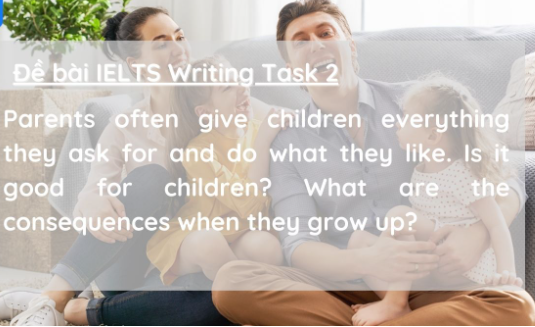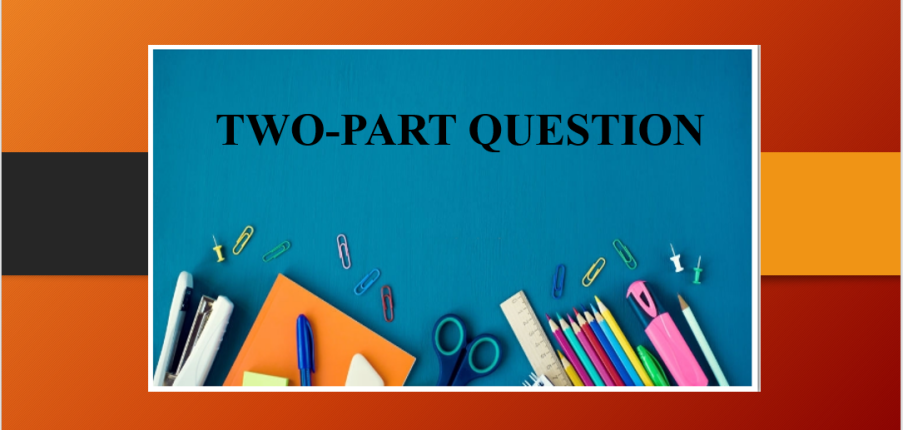Cách viết Two-part question trong IELTS Writing Task 2
Dạng bài Two-part Questions là gì?
Two-part question là dạng bài khá giống với dạng bài Problem – Solution. Đề bài sẽ đề cập với một vấn đề nào đó rồi yêu cầu người viết trả lời 2 câu hỏi liên quan tới vấn đề đó. Các câu hỏi này có thể thuộc một trong bốn dạng bài trước, hoặc là một câu hỏi rất cụ thể, chỉ liên quan tới vấn đề được nhắc tới.
Ví dụ về dạng bài Two-part question:
- “Parents often give children everything they ask for and do what they like. Is it good for children? What are the consequences when they grow up?”
- “Consumers are faced with increasing numbers of advertisements from competing companies. To what extent do you think are consumers influenced by advertisements? What measures can be taken to protect them?”
Tương tự như dạng bài Problem – Solution, ta có thể trả lời từng câu hỏi một ở mỗi thân bài, hoặc xen kẽ lẫn nhau. Tuy nhiên, bạn cũng cần lưu ý phải trả lời cả hai câu hỏi một cách đầy đủ, tránh việc trả lời kỹ hơn ở một câu mà sơ sài ở câu còn lại.
Cách nhận biết chi tiết dạng bài Two-part Questions
Dấu hiệu nhận biết: Dạng bài Two-part Questions này không có một câu hỏi cụ thể nào cả. Thường thì đề bài sẽ bao gồm một câu dẫn để giới thiệu vấn đề, sau đó đưa ra 2 câu hỏi liên quan tới vấn đề đó:
| Câu giới thiệu vấn đề |
Câu hỏi liên quan tới vấn đề |
| Parents often give children everything they ask for and do what they like. Is it good for children? |
What are the consequences when they grow up? |
| Consumers are faced with increasing numbers of advertisements from competing companies. |
o what extent do you think are consumers influenced by advertisements? What measures can be taken to protect them? |
Dàn bài cách viết Two-part Questions
| Dàn bài |
Chi tiết |
| Mở bài |
- General Statement: paraphrase câu hỏi đề bài
- Thesis statement: trả lời lần lượt từng câu hỏi của đề bài một cách ngắn gọn
|
| Thân bài 1 |
- Topic Sentence – Câu chủ đề: paraphrase câu trả lời cho câu hỏi đầu tiên
- Supporting ideas: phát triển ý
|
| Thân bài 2 |
- Topic Sentence – Câu chủ đề: paraphrase câu trả lời cho câu hỏi thứ hai
- Supporting ideas: phát triển ý
|
| Kết bài |
- Restatement of the answer: diễn giải lại câu trả lời
- Prediction/Recommendation: thêm lời dự đoán/đề xuất
|
Một số bài mẫu về Two-part Questions
1. Đề bài IELTS Writing Task 2 ngày 14/04/2018
1.1. Đề bài 14/04/2018
“In today’s world of advanced science and technology, we still greatly value our artists such as musicians, painters and writers. What can arts tell us about life that science and technology cannot?”

1.2. Ideas
What science and technology cannot tell people
-
- Even the latest appliances of science and technology such as robots and even AI cannot imitate human emotions.
- Machines function based on logic and a set of programmed principles and never sympathise or empathise in the way that humans do.
What arts can tell people
-
- Pieces of art (paintings, songs, novels) can reflect how people feel and the emotions of the painters, song writers and writers.
- Art can inspire people to live a better life / can instil in people a sense of humanity.
2. Đề bài IELTS Writing Task 2 25/05/2017
2.1. Đề bài
“Parents often give children everything they ask for and do what they like. Is it good for children? What are the consequences when they grow up?”

2.2. Bài mẫu
Indulging children has become a common parenting problem in many modern families. From a short-term perspective, this practice may slow down the process of children developing essential life skills. From a long-term standpoint, this may cause a sense of overdependence among children.
In the short term, it is possible that over-indulgence causes some delay to the process in which children learn important life skills. This can be seen in a variety of age groups, ranging from toddlers to teenagers. In Vietnam, for example, many over-caring parents spoon-feed their children until they are five or six, the developmental stage in which they should have already been able to eat independently. There is a common practice that parents assist their preadolescent children in taking a bath or a shower. These children, as a result, may fail to acquire basic personal hygiene skills at the right time.
In the long run, the consequences are even more dire as over-indulged children grow up. If parents satisfy all the needs of their children unconditionally, they may inadvertently make the children become over-reliant on them. When these children enter adulthood, the inability to live independently can cause some difficulties for them to maintain their overall well-being, such as not knowing what to do when they catch a fever. It is also a problem that over-indulgent parents are often lenient and do not require children to face the consequences of their misbehaviour. This deprives children of the opportunities to learn from mistakes, which may cause their problem-solving skills to be severely lacking in the future.
From the issues outlined above, one can conclude that overindulgence may produce a number of unfavourable effects on children, including the delay in gaining crucial life skills such as self-feeding and the long-term consequence of lacking the ability to cope with problems as adults in the future. It is recommended that no parents should overindulge their offspring.
Bài tập dạng Two-part
Bài 1: In education and employment, some people work harder than others. Why do some people work harder? Is it always a good thing to work hard?
Bài 2: Happiness if often considered difficult to define. Why is this? What factors determine happiness?
Bài 3: Success is often measured by wealth and material possessions. Do you think wealth is the best measure of success? What makes a successful person?
Bài 3: Nowadays the way many people interact with each other has changed because of technology. In what ways has technology affected the types of relationships that people make? Has this been a positive or negative development?
Bài 4: Nowadays governments are investing more in public transport such as buses and trains rather than in b uilding new roads.
What are the reasons for this?Is this a positive or negative development?
Bài 5: Many people, especially youngsters, spend a lot of their time using social networking sites. Do you think that this is having a bad effect on users? What are the consequences?
Xem thêm các tài liệu Tiếng Anh hay, chi tiết khác:
TOP việc làm "HOT" dành cho sinh viên:





